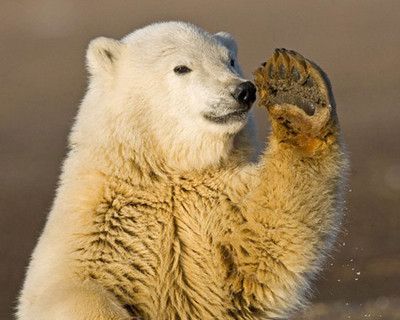(单词翻译:单击)
听力文本
Picture a brave fireman carrying a pet from a burning building.
Now, imagine that global warming is the burning building, a cherry tree is the pet, and a bear is the fireman.
You've now got the gist of a new study that finds that cherry trees may be able to survive rising temperatures thanks to mountain-climbing bears that carry the cherry tree seeds to cooler climes.
It's projected that, over the next hundred years, temperatures on Earth could rise an average of nearly five degrees Celsius.
While some animals might be able to migrate north to escape the brunt of the heat, plants can't uproot themselves quite so easily.
But researchers wondered whether the creatures that disperse plant seeds might be able to help.
So scientists spent three years sifting through the droppings of Asiatic bears, looking for cherry tree seeds.
And they found that the bears were indeed transporting the seeds to cooler locations—not by moving to higher latitudes, but higher altitudes.
Seems the bears snack on the fruits that are found at the foot of the mountains in spring and then make the climb to higher elevations to enjoy young leaves and buds and flowers, particularly as the season progresses.
The researchers could tell that seeds had been deposited higher up the mountain than they had been harvested by the ratio of their oxygen isotopes, which changes with altitude.
And the 300 or so meters the seeds ascended should buy the resulting trees a degree or two in heat relief.
The study is in the journal Current Biology.
The finding is good news for plants, like cherry trees, that fruit in spring.
Unfortunately, the results suggest that plants that fruit in fall, when bears are headed back down for hibernation, will have to hold out for a different animal hero.
Or for a bear with a bad sense of direction.
参考译文
想象一下一位奋不顾身的消防队员将一只宠物从熊熊大火建筑物中抢救出来的情景。
现在,想象下全球变暖就是着火的建筑物,樱桃树就是那只宠物,而熊就是这位英勇的消防员。
现在你肯定已经或多或少了解到这项新的研究,那就是得益于爬山熊将樱桃树的种子带到凉爽的地区,这种树木才可以在高温条件下存活。

预计未来的100年中,地表平均温度将上升5摄氏度。
而很多动物可能会前往北部地区躲避高温,但植物却不能够轻易搬家。
但研究人员认为如果动物能够传播植物的种子可能会起到帮助。
因此科学家们历时三年仔细寻找亚洲熊粪便中的樱桃树种。
而结果他们发现发现亚洲熊实际上将种子带到了更为凉爽的地方—不是前往高纬度地区,而是到了高海拔地区。
亚洲熊在春天会以山脚下的水果为食,而随着季节的推进,它们就会爬到更高处享用那里的嫩叶,花蕾及花朵。
通过研究氧同位素的比例,研究人员发现随着海拔的变化,种子所在地区的海拔会升高。
种子所在地区的海拔每增加300米左右,温度就会降低1-2度。
这项研究已经在《当代生物学》杂志上发表。
这一发现对樱桃树等春天结果的植物是个利好消息。
但不幸的是,这项研究表明由于亚洲熊们已经去冬眠,因此秋天结果的植物就只能期待另外的救星。
或者是依赖一只方向感不太好的熊。
译文为可可英语翻译,未经授权请勿转载!
重点讲解
1.thanks to 由于;因为
例句:Thanks to that job I became an avid reader.
多亏了那份工作我才成了一个喜欢阅读的人。
2.be able to 能够
例句:If only I could get some sleep, I would be able to cope.
要是能睡上一会儿,我就能应付了。
3.look for 寻找
例句:I was just going to look for you and here you are.
我正要找你,恰好你来了。
4.cherry tree 樱桃树
例句:Plum was grafted on the cherry tree.
樱桃树上嫁接李子。


